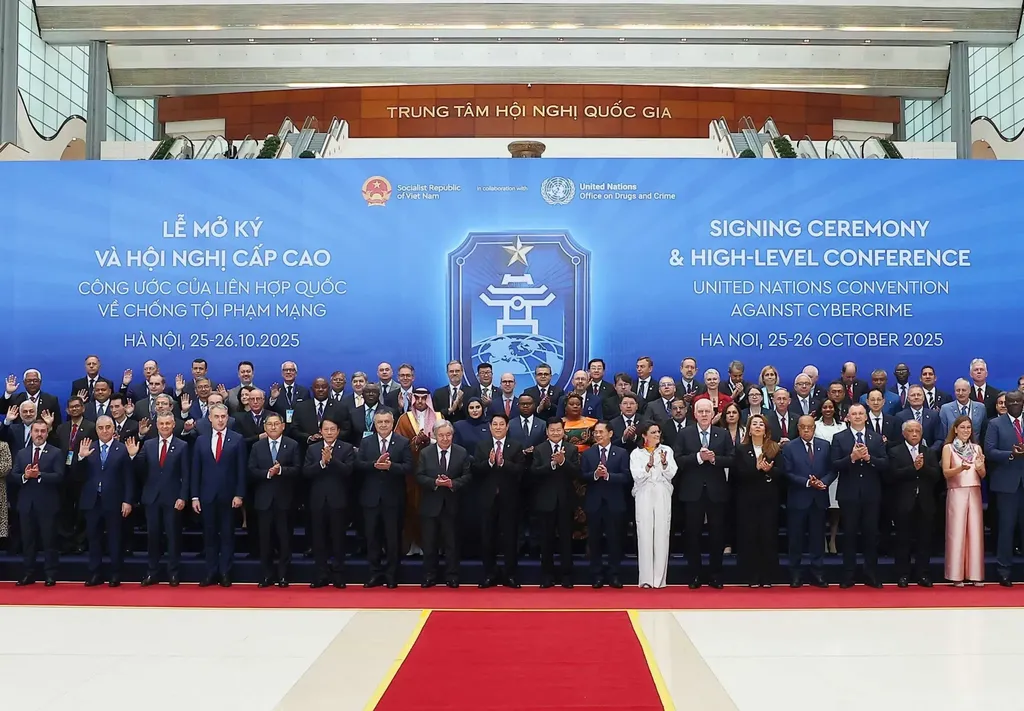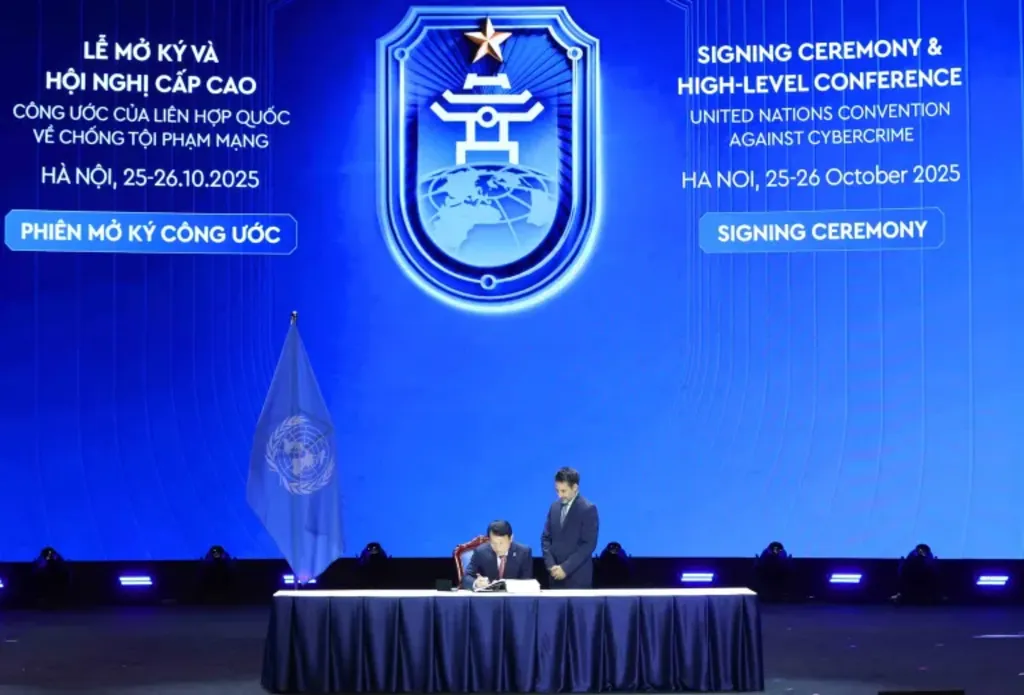 |
| President Luong Cuong and UN Secretary-General António Guterres in a group photo with heads of delegations of countries joining the signing ceremony and high-level conference__Photo: VNA |
After two days of dynamic and productive sessions on October 25–26, the Signing Ceremony and High-Level Conference of the United Nations Convention against Cybercrime (Hanoi Convention) has concluded in Hanoi, marking a historical milestone and ushering into a new era of global cooperation in the digital era.
The most significant outcome of the event was the official signing of the Hanoi Convention by 72 countries. Geographically, 19 are from the Asia-Pacific region, 21 from Africa, 19 from Europe plus the European Union, and 12 from Latin America, showing the Convention’s global reach and balanced geographical representation. This makes the event one of the largest convention signing ceremonies in the past 10 years, according to the United Nations.
 |
| Vietnamese Minister of Public Security Luong Tam Quang signs the convention__Photo: VNA |
The event welcomed more than 2,500 delegates from 110 national delegations, 150 international, regional and private organisations along with over 50 research institutions. This figure exceeded our expectations, reflecting the broad and genuine interest of the international community and friends around the world in this event, which is the first of its kind held in Vietnam, according to the Ministry of Public Security.
The signing ceremony and high-level conference of the convention also received strong attention from domestic and international media, with more than 400 reporters from 189 news agencies.
During the sideline events and discussions, there were 71 speeches from national representatives, international organisations and technology corporations, offering varied and constructive perspectives for the upcoming implementation of the convention.
Particularly, the main signing ceremony in Hanoi was broadcast live on the United Nations Web TV system, creating opportunities for access and outreach to member states and UN bodies through simultaneous interpretation in all six official UN languages. This is the first time an event hosted by Vietnam has been communicated in all official languages of the United Nations.
 |
| Party General Secretary To Lam poses for a group photo with heads of delegations attending the signing ceremony of the Hanoi Convention__Photo: VNA |
In addition to professional activities, heads of international delegations also held high-level meetings with leaders of the Party and State of Vietnam, including a meeting with Party General Secretary To Lam, a state banquet hosted by President Luong Cuong, and an international press conference chaired by Prime Minister Pham Minh Chinh.
For safer future and the next milestone
The negotiation process of the Convention, which began with United Nations General Assembly Resolution 74/247 in 2019, is recognized as one of the most comprehensive and inclusive efforts to draft a convention in UN history. The Convention was adopted by consensus, reflecting the serious commitment of the member states.
Delegates at the event agreed that a spirit of collective action for global cyber safety is essential to turning commitments into reality. UN Secretary-General António Guterres underscored this with a brief but powerful message: "No one is safe, until everyone is safe."
The true strength of the Hanoi Convention lies not in the signatures on the document, but in the actions of each country following the signing ceremony. The UN Secretary-General told the Vietnam News Agency that the most important thing is to ratify it as quickly as possible, and then to promptly establish implementation mechanisms, while ensuring the capacity and privilege for effective international cooperation.
John Brandolino, Director for the Division for Treaty Affairs at the UN Office for Drugs and Crime (UNODC), said the Hanoi Convention paves the way for a safer and more equitable future for everyone – both in the real world and in cyberspace. However, he noted that the negotiation of the Convention is only the first step. The next task for the countries is to work together toward the milestone of the Convention coming into force.
Vietnam as proactive, responsible, trusted contributor
Vietnam’s hosting of the signing ceremony demonstrates its role as a proactive, responsible, resilient, and goodwill nation. Minister of Public Security Luong Tam Quang highlighted three key consensual outcomes achieved through the event.
First, the Hanoi Convention represents a historic strategic step, providing a legal foundation for international cooperation, affirming the value of multilateral collaboration, and respecting national sovereignty.
Second, the presence of a large number of countries reflects the spirit of solidarity, political will, and strong determination of the international community in the fight against cybercrime.
Third, the successful organization of the opening signing ceremony in Hanoi reaffirms the central role of the United Nations and demonstrates the international community’s trust and confidence in Vietnam, and the Vietnam Ministry of Public Security, for credibility, capacity, and responsible role in addressing global challenges.
Major General Le Xuan Minh, Director of the Cybersecurity and High-Tech Crime Prevention Department under the Ministry of Public Security, told the Vietnam News Agency that the Hanoi Convention is a unique international criminal justice convention that is still being developed and refined, and has now entered the implementation phase.
The Convention addresses entirely new issues facing the society and the international community today. Therefore, putting the Convention into practice and incorporating it into domestic law so that countries can ratify and collectively fulfill their commitments is extremely important. This is a shared responsibility of all countries, particularly their leaders, judicial, and law enforcement agencies, he said.
Major General Nguyen Quoc Toan, Chief of the Office of the Ministry of Public Security, said Vietnam’s Ministry of Public Security will lead the implementation of the Hanoi Convention. After signing, countries will ratify it, and Vietnam will review and update its domestic laws to enable enforcement.
Already a member of the UN Conventions against Transnational Organized Crime (UNTOC) and Corruption (UNCAC), Vietnam brings experience and international recognition in implementing such treaties, he said, adding that close law enforcement cooperation with other countries provides a strong foundation for expanding collaboration under this new cybercrime Convention.
Deputy Minister of Foreign Affairs Nguyen Minh Vu said the signing of the Hanoi Convention in Vietnam marks an important milestone. As other countries continue to sign and ratify it, they will see that a developing country like Vietnam is ready to work alongside others to build a safe, healthy, and humane cyberspace for all. This also serves as a source of inspiration and a positive message in the global fight against cybercrime.
The support of other countries and the UN’s selection of Vietnam as the host for the signing ceremony also carries great significance. the official said. It shows that, although Vietnam’s technological level and cybercrime enforcement capacity may not yet match that of many developed countries, Vietnam has courageously taken the lead, demonstrating the strong spirit and commitment of a developing nation ready to stand at the forefront alongside the international community in facing urgent cybersecurity challenges, he stressed.
The success of the Hanoi Convention signing marks Vietnam’s shift from participation to active engagement, raising its multilateral diplomacy to a new level. The event also laid the groundwork for a global United Nations instrument, set to serve as a legal framework for member states to cooperate in combating cybercrime. The international community is now moving toward the next milestone: bringing the Hanoi Convention into force.- (VNA/VLLF)









